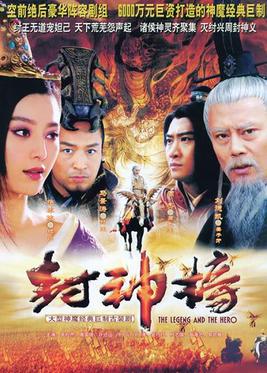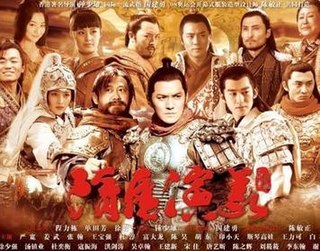
Li Bai, formerly pronounced Li Bo, courtesy name Taibai (太白), was a Chinese poet acclaimed as one of the greatest and most important poets of the Tang dynasty and in Chinese history as a whole. He and his friend Du Fu (712–770) were two of the most prominent figures in the flourishing of Chinese poetry under the Tang dynasty, which is often called the "Golden Age of Chinese Poetry". The expression "Three Wonders" denotes Li Bai's poetry, Pei Min's swordplay, and Zhang Xu's calligraphy.

Emperor Xuanzong of Tang, personal name Li Longji, was an emperor of the Tang dynasty of China, reigning from 712 to 756 CE. His reign of 44 years was the longest during the Tang dynasty. Through two palace coups, he seized the throne and inherited an empire still in its golden age. He was initially assisted by capable chancellors like Yao Chong, Song Jing and Zhang Yue who were already serving as government officials before Xuanzong ascended the throne. However, under Emperor Xuanzong, the empire reached its turning point and went into sharp decline and near collapse, due to numerous political missteps throughout his long reign, such as over-trusting Li Linfu, Yang Guozhong and An Lushan, with Tang's golden age ending in the An Lushan Rebellion.
Li Linfu, nickname Genu, formally the Duke of Jin, was a Chinese historian, musician, and politician during the Tang dynasty, serving as a chancellor for 18 years (734–752), during the reign of Emperor Xuanzong—one of the longest terms of service for a chancellor in Tang history, and the longest during Xuanzong's reign.
Zhang Yue (663–730), courtesy name Daoji (道濟) or Yuezhi (說之), formally Duke Wenzhen of Yan (燕文貞公), was a Chinese historian, military general, poet, and politician. He served as an official under Wu Zetian's Zhou dynasty, a chancellor with three separate stints during the reigns of Emperor Ruizong and under Emperor Xuanzong. He was known for having suggested the transition of Tang central government armed forces from being conscription-based to recruitment-based, and for turning the office of the chancellor into a specialized post with strong executive powers.
Li Shizhi, né Li Chang (李昌), formally the Duke of Qinghe (清和公), was a Chinese poet and politician during the Tang dynasty, serving as a chancellor during the reign of Emperor Xuanzong. He was known as one of the Eight Immortals of the Wine Cup due to his ability to drink a large amount of wine without becoming drunk.
The chancellor was a semi-formally designated office position for a number of high-level officials at one time during the Tang dynasty of China. This list also includes chancellors of the short-lived Wu Zhou dynasty, which is typically treated as an interregnum of the Tang dynasty by historians.
Li Jin was an imperial prince and member of the royal family in the Tang dynasty. He was the eldest son of crown prince Li Chengqi, and grandson of Emperor Ruizong. Li Jin's father, Li Chengqi, yielded his claim to the throne to his younger brother, Li Longji, who eventually became Emperor Xuánzong of Tang. Li Jin was adored by his uncle, the Emperor Xuánzong, who personally taught him to play music. He also gave him a prominent position in the government, and the title Prince of Ruyang. Li Jin "excelled at poetry and calligraphy, carrying himself with scholarly bearing." He was skilled at playing the drum, and was also known for his ability in archery. Li Jin had a number of siblings, among them, Li Yu, and Li Xiang, who is the father of Li Shizhi mentioned with Li Jin in Du Fu's infamous poem, "The Eight Immortals of the Wine Cup".

Tang poetry refers to poetry written in or around the time of or in the characteristic style of China's Tang dynasty, and/or follows a certain style, often considered as the Golden Age of Chinese poetry. The Complete Tang Poems includes over 48,900 poems written by over 2,200 authors. During the Tang dynasty, poetry continued to be an important part of social life at all levels of society. Scholars were required to master poetry for the civil service exams, but the art was theoretically available to everyone. This led to a large record of poetry and poets, a partial record of which survives today. The two most famous poets of the period were Li Bai and Du Fu. The Qing dynasty selection, Three Hundred Tang Poems, has made Tang poetry familiar to educated Chinese in modern times.

Three Kingdoms is a 2010 Chinese television series based on the events in the late Eastern Han dynasty and the Three Kingdoms period. The plot is adapted from the 14th century historical novel Romance of the Three Kingdoms and other stories about the Three Kingdoms period. Directed by Gao Xixi, the series had a budget of over 160 million RMB and took five years of pre-production work. Shooting of the series commenced in October 2008, and it was released in China in May 2010.

The Water Margin is a 1998 Chinese television series adapted from Shi Nai'an's classical 14th-century novel of the same title. It was produced by CCTV with Zhang Jizhong as producer. It was first broadcast in China in January 1998. The series also featured action choreography by Yuen Woo-ping.

The Legend and the Hero was a 2007 Chinese television series adapted from the 16th-century novel Fengshen Yanyi written by Xu Zhonglin and Lu Xixing. The first season started airing on CCTV-8 in February 2007. It was followed by a sequel, The Legend and the Hero 2 in 2009.

All Men Are Brothers is a 2011 Chinese television series adapted from Shi Nai'an's 14th century novel Water Margin, one of the Four Great Classical Novels of Chinese literature. The series is directed by Kuk Kwok-leung and features cast members from mainland China, Taiwan and Hong Kong. The series was first broadcast on 8TV in March 2011 in Malaysia.

Justice Bao is a Chinese TV series starring producer Jin Chao-chun as the Song dynasty official Bao Zheng. The series ran for 3 seasons from 2010 to 2012. In addition to Jin, Kenny Ho, Fan Hung-hsuan and Lung Lung again reprise their iconic roles from the 1993 Taiwanese hit Justice Pao and the 2008 Chinese series Justice Bao.

Tang Ming Huang is a Chinese television series based on historical events in the reign of Emperor Xuanzong of the Tang dynasty. The series was directed by Chen Jialin and starred Liu Wei as the eponymous emperor. It was first broadcast on CCTV-1 in 1990 in mainland China.

Wu Zi Bei Ge, also known as Wu Zi Bei Ge: Wu Zetian Zhuan, is a 2006 Chinese television series based on the life of Wu Zetian, the only woman in Chinese history to assume the title of "Empress Regnant". The series was directed and written by Chen Yanmin, and starred Siqin Gaowa and Wen Zhengrong as the empress. The series' title Wu Zi Bei Ge literally means "Song of the Uncharactered Stele", with the "stele" referring to the unmarked one standing near Wu Zetian's tomb at the Qianling Mausoleum.

Heroes in Sui and Tang Dynasties is a Chinese television series based on Chu Renhuo's historical novel Sui Tang Yanyi, which romanticises the historical events leading to the fall of the Sui dynasty and the rise of the Tang dynasty. The series was first broadcast in mainland China on various television networks on 14 January 2013. It is not to be confused with Heroes of Sui and Tang Dynasties 1 & 2, a similar television series also based on the novel, but was released earlier in December 2012. Filming for the series started on 5 November 2011 at the Hengdian World Studios and wrapped up in May 2012.

The China men's national volleyball team represents China in international volleyball competitions and friendly matches, governed by Chinese Volleyball Association. The team competed twice in the Olympic Games, finishing in eighth place at the 1984 Summer Olympics in Los Angeles, California, and fifth place in the 2008 Summer Olympics at home in Beijing. China have been consistently competing the FIVB World Championship, with a best of seventh place in both 1978 and 1982. On a continental level, China won three gold medals at the Asian Games, in 1986, 1990 and 1998. China also won 3 gold medals at the Asian Championship in 1979, 1997 and 1999. The team now ranks 26th in the FIVB World Rankings and the current head coach is Vital Heynen.

Mingzhou or Ming Prefecture (738–1194) was a zhou (prefecture) in imperial China located in modern northeastern Zhejiang, China, around modern Ningbo. The prefecture was called Yuyao Commandery from 742 to 758.














